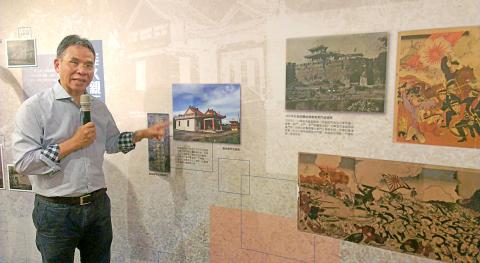An exhibition titled “Archival Exhibition on Inverting 1895: 120 Years After the War of Yi-We” (鉅變一八九五—乙未之役.一百二 十年檔案特展), which examines both resistance to and acceptance of Japanese colonial rule is currently being hosted by the Academia Sincia in Taipei.
The War of Yi-Wei (乙未之役), referring to the name of the year in the Chinese lunar calendar, is the Chinese term for the five-month war in 1895 between Empire of Japan and anti-Japanese insurgents who rose up after the Republic of Formosa declared independence in response to Japan’s annexation of the formerly insular Qing province.
Academia Sinica’s Institute of Taiwanese History director Hsieh Kuo-Hsing (謝國興), whose institute jointly organized the exhibition with the Academia Sinica’s Digital Center, said the exhibition is named “Inverting 1895” because it focuses on reversing nationalist historiography that focuses solely on resistance.

Photo: Tang Chia-ling, Taipei Times
The prevalent Han-Chinese nationalist perspective is simplistic and distorts historical fact, he said.
“In order to give full justice to history’s complexity, the interpretation of the past must proceed from the original documents and texts, instead of textbooks,” Hsieh said.
Most of the island’s inhabitants chose to accept Japanese rule in 1895 in order to survive, he said.
“There are multiple strategies to achieving survival, and welcoming Japanese rule was a viable alternative to resistance,” Hsieh said, adding that denouncing people for being “obsequious” to Japan or the Qing Dynasty is prejudicial and narrow-minded.
Hsieh said there are other narratives the exhibition aims to subvert. For example, he called the Republic of Formosa’s founding “a pretext” that has little to do with Taiwanese independence, but a “stratagem to thrust the Japanese annexation of Taiwan onto the international stage.”
Hsieh said the strategy backfired because no nation expressed interest in an intervention, and Formosa Republic officials, including its president Tang Ching-sung (唐景崧), fled.
“The only people who resisted Japan courageously were ordinary citizens. All of the officials had turned tails,” he said.
After the First Sino-Japanese War, Japan included in the Treaty of Shimonoseki articles that, in addition to annexing Taiwan, gave its inhabitants two years to decide whether to sell their property and leave or to remain in Taiwan under Japanese rule, Hsieh said. About 6,000 people emigrated, or only about one person in 1,000 in relation to the pre-war population, Hsieh said.
“Historians of Taiwan by consensus consider ‘Japanese rule’ (日治) to be better as a term of periodization because it reflects the epoch’s historical reality and is more neutral, while ‘Japanese occupation’ (日據) is far less supported by evidence, since Japanese rule was not based on a forceful military occupation,” Hsieh said.
After the end of the war, inhabitants of Taiwan received internal passports that identified them as “new subjects” (新臣民), while Japanese citizens were identified as “civilians” (平民), he said.

ANOTHER EMERGES: The CWA yesterday said this year’s fourth storm of the typhoon season had formed in the South China Sea, but was not expected to affect Taiwan Tropical Storm Gaemi has intensified slightly as it heads toward Taiwan, where it is expected to affect the country in the coming days, the Central Weather Administration (CWA) said yesterday. As of 8am yesterday, the 120km-radius storm was 800km southeast of Oluanpi (鵝鑾鼻), Taiwan’s southernmost tip, moving at 9kph northwest, the agency said. A sea warning for Gaemi could be issued tonight at the earliest, it said, adding that the storm is projected to be closest to Taiwan on Wednesday or Thursday. Gaemi’s potential effect on Taiwan remains unclear, as that would depend on its direction, radius and intensity, forecasters said. Former Weather Forecast

As COVID-19 cases in Japan have been increasing for 10 consecutive weeks, people should get vaccinated before visiting the nation, the Centers for Disease Control (CDC) said. The centers reported 773 hospitalizations and 124 deaths related to COVID-19 in Taiwan last week. CDC Epidemic Intelligence Center Director Guo Hung-wei (郭宏偉) on Tuesday said the number of weekly COVID-19 cases reported in Japan has been increasing since mid-May and surpassed 55,000 cases from July 8 to July 14. The average number of COVID-19 patients at Japan’s healthcare facilities that week was also 1.39 times that of the week before and KP.3 is the dominant

The Chinese Communist Party’s (CCP) working group for Taiwan-related policies is likely to be upgraded to a committee-level body, a report commissioned by the Mainland Affairs Council (MAC) said. As Chinese President Xi Jinping (習近平) is increasingly likely to upgrade the CCP’s Central Leading Group for Taiwan Affairs, Taiwanese authorities should prepare by researching Xi and the CCP, the report said. At the third plenary session of the 20th Central Committee of the CCP, which ended on Thursday last week, the party set a target of 2029 for the completion of some tasks, meaning that Xi is likely preparing to

US-CHINA TRADE DISPUTE: Despite Beijing’s offer of preferential treatment, the lure of China has dimmed as Taiwanese and international investors move out Japan and the US have become the favored destinations for Taiwanese graduates as China’s attraction has waned over the years, the Ministry of Labor said. According to the ministry’s latest income and employment advisory published this month, 3,215 Taiwanese university graduates from the class of 2020 went to Japan, surpassing for the first time the 2,881 graduates who went to China. A total of 2,300 graduates from the class of 2021 went to the US, compared with the 2,262 who went to China, the document showed. The trend continued for the class of 2023, of whom 1,460 went to Japan, 1,334 went to